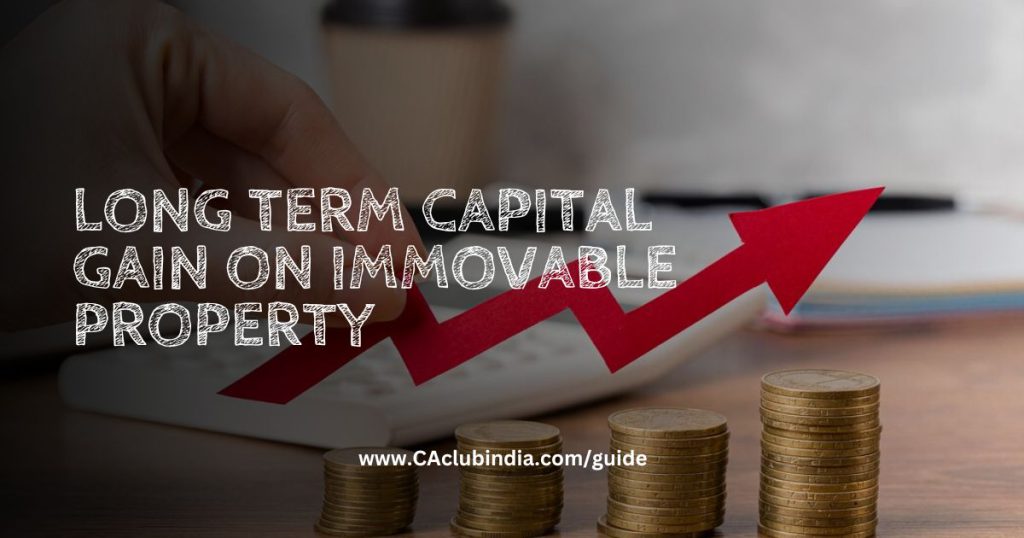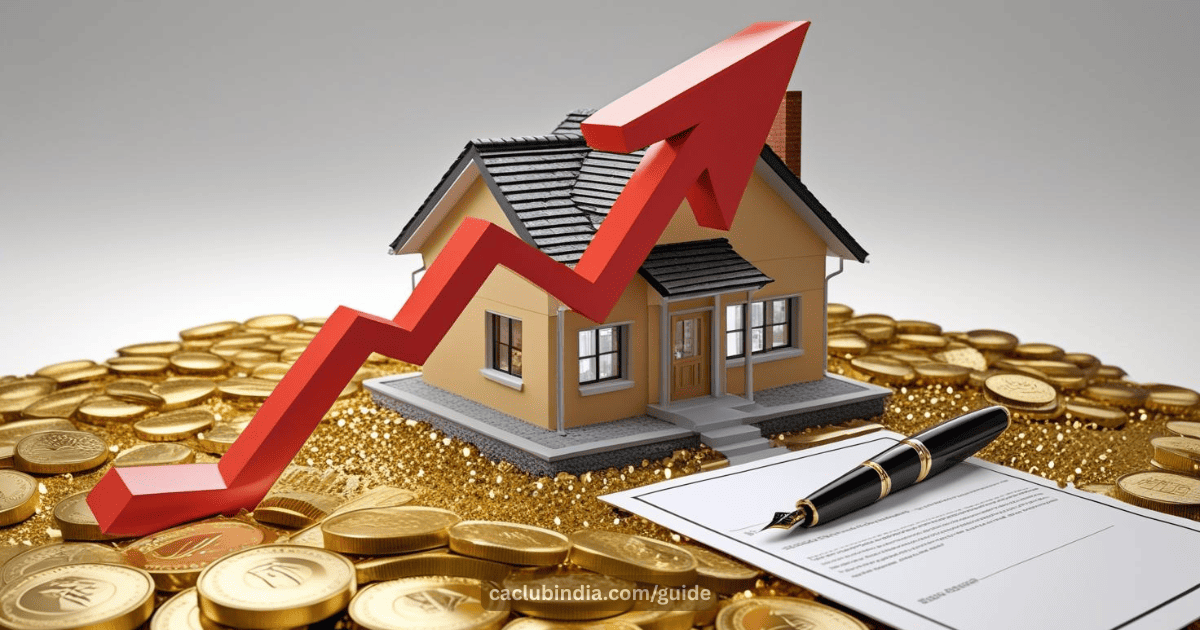Long-term capital gain mean arising from the transfer of long term capital asset.
What is a long-term capital asset?
A long-term capital asset means an asset held by an assessee for more than 12/24/36 months (depending upon the type of asset) immediately preceding the date of its transfer.

When does an immovable property deemed to be a long-term capital asset?
An immovable property, being land or building or both, when sold, would be treated as long-term capital gains (LTCG), if the period of holding is more than 24 months.
Tax implications on Long-term capital gains for immovable property
When it comes to LTCG on sale of property, we have two situations based on the date of sale of property:
Property sold before 23rd July, 2024- 20% with factoring indexation benefit
[Applicable Tax Rate- 20.8% (including health and education cess @4%)]
Property sold on or after 23rd July, 2024- 12.5% without factoring indexation benefit
[Applicable Tax Rate- 13% (including health and education cess @4%)]
Hence, the taxpayers can exercise either of the options above in case of sale of property.
However, these options shall be restricted for purchases made on or before 22nd July, 2024.
Eligibility of the new scheme as proposed in the Budget 2024
These options are available only for Individuals and Hindu Undivided Family (HUF) and not for any other classes such as Companies/ LLPs/ firms.
Further, these options are available for both residential and commercial properties.
Computation of tax on long-term capital gains from sale of property
| Particulars | Amount | Amount |
| Full value of sale consideration | XXX | |
| Less: Expenses incurred wholly and exclusively in connection with such transfer | XXX | |
| Net Sale Consideration | XXX | |
| Less: Indexed Cost of Acquisition | XXX | |
| Less: Indexed Cost of Improvement | XXX | |
| Long-term capital gains (LTCG) | XXX | |
| Less: Exemption u/s 54/54B/54D/54EC/54F | XXX | |
| Taxable Long-term capital gains (LTCG) | XXX |
The calculation of Indexed Costs are given below:
Indexed Cost of Acquisition = Cost of Acquisition * Cost Inflation Index (CII) for the year in which the asset is transferred / Cost Inflation Index (CII) for the year in which the asset was first held by the assessee or P. Y. 2001-02, whichever is later.
Indexed Cost of Improvement = Cost of Improvement * Cost Inflation Index (CII) for the year in which the asset is transferred / Cost Inflation Index (CII) for the year in which the improvement took place.
Cost Inflation Index (CII) in relation to a previous year means such index as may be notified by the Central Government having regard to 75% of average rise in the Consumer Price Index (Urban) for the immediately preceding previous to such previous year.
This index shall be notified by the Central Board of Direct Taxes (CBDT) every year. CII for the financial year 2024-25 (AY 2025-26) shall be 363.
Treatment of long-term capital loss arising from transfer made
Long-term capital loss arising from transfer made will be a lowed to be set-off and carried forward in accordance with the provisions of the Income Tax Act, 1961. It can be set-off against any other long-term capital gains and unabsorbed loss can be carried forward to subsequent eight years for set-off against long-term capital gains.
Tax Exemptions available on long-term capital gains
| Particulars | Conditions |
| Section 54 | 1. Available for Individual/ HUF 2. Asset transferred must be a residential house 3. Property, the assessee is selling must be a long-term capital asset 4. Property should be in India Maximum exemption – Rs. 10 crore |
| Section 54B | 1. Available for Individual/ HUF 2. Asset transferred must be a urban agricultural land 3. Land must be used for agricultural purpose |
| Section 54D | 1. Available for any assessee 2. Land & Building should form a part of industrial undertaking 3. Should have aright in land or building 4. Exemption limit – Lower of cost of new asset and Capital gain |
| Section 54EC | 1. Available for any assessee 2. Land or Building or both 3. Bonds of NHAI, RECL, CG, PFC, IRFC etc as notified by Central governement 4. Maximum exemption- Rs. 50 lakhs |
| Section 54F | 1. Available for Individual/ HUF 2. Any long-term capital asset other than residential house 3. Qualifying asset shall be one residential house in India |
Conclusion
This sums up the fundamentals, tax rates, tax implications, exemptions etc. as per latest changes proposed in the Union Budget 2024. The indexation benefit has been currently removed in the Budget to bring all asset classes under one rate and to lower tax liability. This article may help to decipher the practical implications of capital gains in an easier manner.
FAQs
Long-term capital gains on immovable property are not exempt but you can save tax u/s 54, if you reinvest the proceeds in another residential property.
When a holding period of any immovable property more than 24 months, then it is classified as a long-term capital asset and taxed under LTCG rules.
The exemption limit for LTCG on equity shares or equity-oriented units has increased from Rs. 1 lakh to Rs. 1.25 lakh per year. However, the tax rate on gains has risen from 10% to 12.5%.

